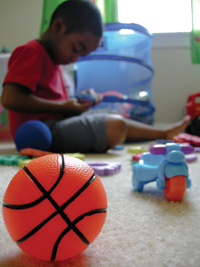Mop the kitchen floor. Pick up toys. Fold laundry. Repeat.
If this sounds like your typical day, wouldn’t it be nice to recruit a little help? Believe it or not, your toddler can lighten your load by learning to pick up after herself. “Helping out around the house makes toddlers feel like part of the community and gives them a place to be responsible,” says Jewish Community Center (JCC) preschool teacher Terri Schuster. Fellow JCC teacher Laura Gettleman agrees: “Chores give children a sense of accomplishment and pride, and help to teach practical skills.”
 Introducing chores
Introducing chores
Children as young as 2 can understand that helping out is a responsibility of being in a family, according to Schuster. Seattle mother Beaven Walters told her 4-year-old daughter that as a member of the family, it was her responsibility to start doing things to help around the house. “Her chores are making her bed, sweeping up crumbs on the floor after meals, setting the table for dinner, picking up her toys, and carrying her dishes and cup to the sink,” says Walters.
Coaching toddlers
Schuster suggests working with your kids on the chores. “It’s important to clean with them, always modeling and occasionally cleaning up around them,” said Schuster. Child psychologist Elizabeth Hletko stresses the importance of letting your toddler know exactly what you expect. “Clean up your toys” is much too broad. Instead, Hletko suggests creating a specific space for different toys, such as a bin for balls or stuffed animals, and showing your child where each toy belongs. Gettleman agrees, adding that this approach can result in children who are more careful with their things. “Kids like organization,” she says. “They have more respect and are more invested if each toy belongs in its own place.”
Make it fun
Cleaning up can be fun, say Schuster and Gettleman. Parents can use tongs to help pick up toys, challenge their children to put toys in fun receptacles or time cleanup activities in 30-second or one-minute intervals. “You can assign one sibling to pick up Legos while the other picks up cars and make it a race,” says Gettleman. Seattle mother Joanna Mattson keeps cleanup playful with her 4-year-old daughter: “I’ll try to make it into a game by telling her, ‘I’ll get the yellow beads, you get the red,” or “You put in three, and I’ll put in one,” Mattson says.
Add a song
Familiar cleanup songs give children a predictable amount of time to complete a task, according to Schuster. “If children know when the song will end, they are racing to clean up by the end,” Schuster says. “Some of our favorite cleanup songs are ‘Oh My Goodness, Look at This Mess’ by Sweet Honey in the Rock or ‘Clean Up’ on Ralph’s World.”
Show pictures
Actual pictures of your child doing the chore can serve as a reminder, according to Hletko. She advises making a chore chart that includes pictures of your child doing chores. The picture chart can serve as an easy reminder about how chores are done.
Enforce consequences
If toys are not cleaned up, it is OK to take them away for a limited time, according to Gettleman, who suggests parents consider taking a toy away for a short time if it isn’t put away. Walters agrees: “Chores should be expected of children as their contribution to the family. If they refuse to do their chores, then privileges should be taken away.”
High five!
When a chore is finished, Schuster says, parents should talk it over with their tot. “Help them look around and evaluate what they cleaned. Ask them, ‘What did you clean up?’ This gives them a sense of responsibility and pride,” Schuster says. Gettleman also encourages a simple reward — such as a high five or a stamp on each hand — when they finish cleaning up an area. Hletko adds that toddlers thrive on your praise: “Let your child know that you appreciate their help with chores.”
Jodi Sternoff Cohen is a Seattle-based writer and marketing consultant. She lives with her husband and two children, Carly, age 4, and Max, age 2.
Chores for a 3-year-old
Pick up toys after playing with them
Place napkins on the table
Place dirty clothes in a laundry basket
Water a plant
Clear dishes from the table
Chores for a 4-year-old
- Sort laundry
- Clean up own spills
Prepare a simple snack
Help make bed
Remove wet towels from the floor
Chores for a 5-year-old
Set plates, forks, and napkins on the table
Remove silverware from the dishwasher- Fold towels
Dust
Pour milk
Help with food preparation









